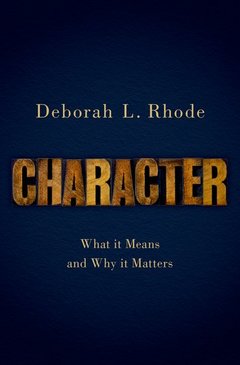Character What it Means and Why it Matters
Langue : Anglais
Auteur : Rhode Deborah L.

Americans claim to care about character. Over four fifths want it taught in public schools, and 95 percent think that a president's character is important. And historically, philosophers, educators, politicians, religious leaders, judges, and the general public have agreed that character should be valued and reinforced. Yet in the United States, the institutions charged with that mission have consistently fallen short. Simply put, too little effort has been made to understand the importance of character and the strategies that can best develop and support it. After first exploring the history of the concept over time, Deborah Rhode turns her focus to the institutions that have traditionally fostered good character: families, schools, youth organizations, civic groups, and political organizations. However, as we have increasingly de-emphasized the subject-a trend that is most evident in our politics-our awareness of its shaping influence has waned. Indeed, we often focus on the wrong things when it comes to fostering good character. For instance, almost a third of the workforce is covered by licensing laws requiring good moral character, even occupations where the need for screening is not self-evident: florist, fortune teller, and frog farmers. Character also plays a pivotal role in the criminal justice system, in defining guilt, punishment, and eligibility for parole. All too often, these legal requirements are idiosyncratic, inequitable, and subject to race and class bias. Millions of Americans who have convictions for minor offenses are excluded from a vast range of occupations and benefits without evidence that such exclusion serves the public interest. We can do better, she stresses, and outlines a powerful program for reform. Rhode punctuates the book through a series of portraits of exemplary individuals whose good character made them who they were: Ida B. Wells, Jane Addams, Martin Luther King, Mother Teresa, Nelson Mandela, Albert Schweitzer, and Thurgood Marshall. All of these individuals had flaws, but through their commitments to both social justice and helping the less fortunate, they all demonstrate the power and importance of strong character.
Deborah L. Rhode is the Ernest W. McFarland Professor of Law, and the director of the Center on the Legal Profession at Stanford University. She was the founding president of the International Association of Legal Ethics, the former president of the Association of American Law Schools, and the former founding director of Stanford's Center on Ethics. She is the nation's most frequently cited scholar on legal ethics and the author of 30 books in the fields of professional responsibility, leadership, and gender.
Date de parution : 10-2019
Ouvrage de 328 p.
16.3x24.2 cm
Disponible chez l'éditeur (délai d'approvisionnement : 21 jours).
Prix indicatif 33,52 €
Ajouter au panierThèmes de Character :
© 2024 LAVOISIER S.A.S.



